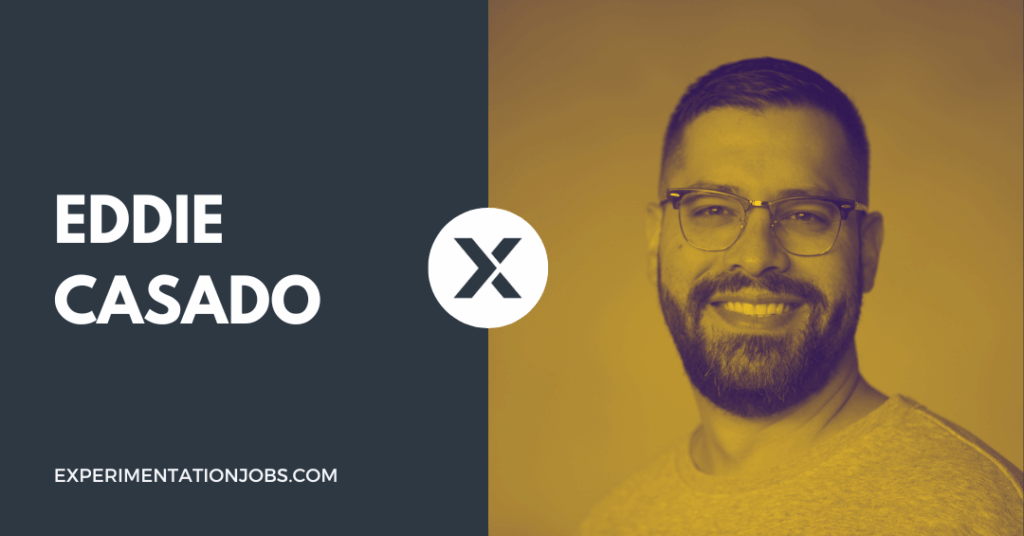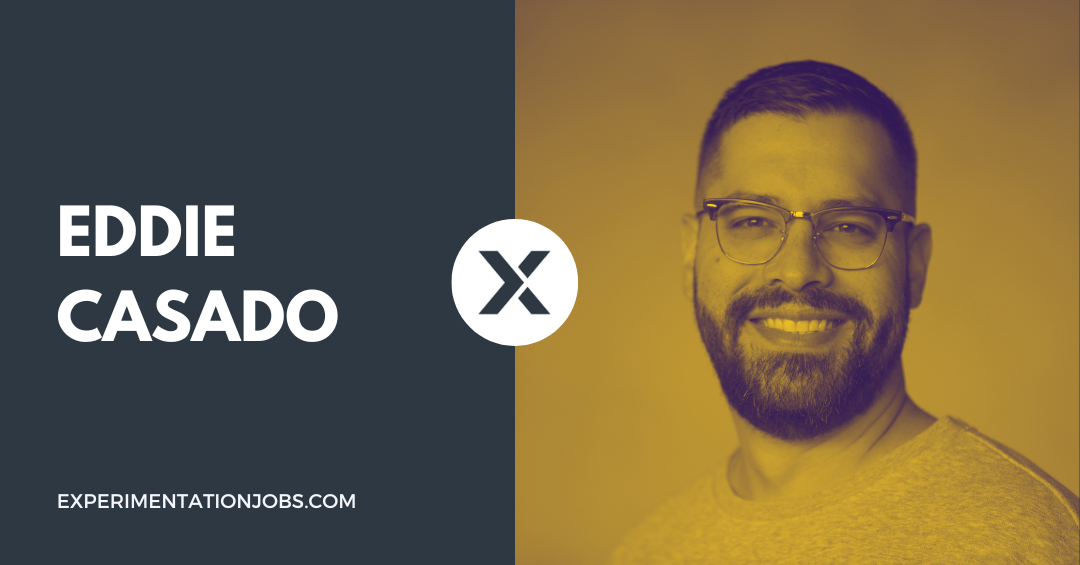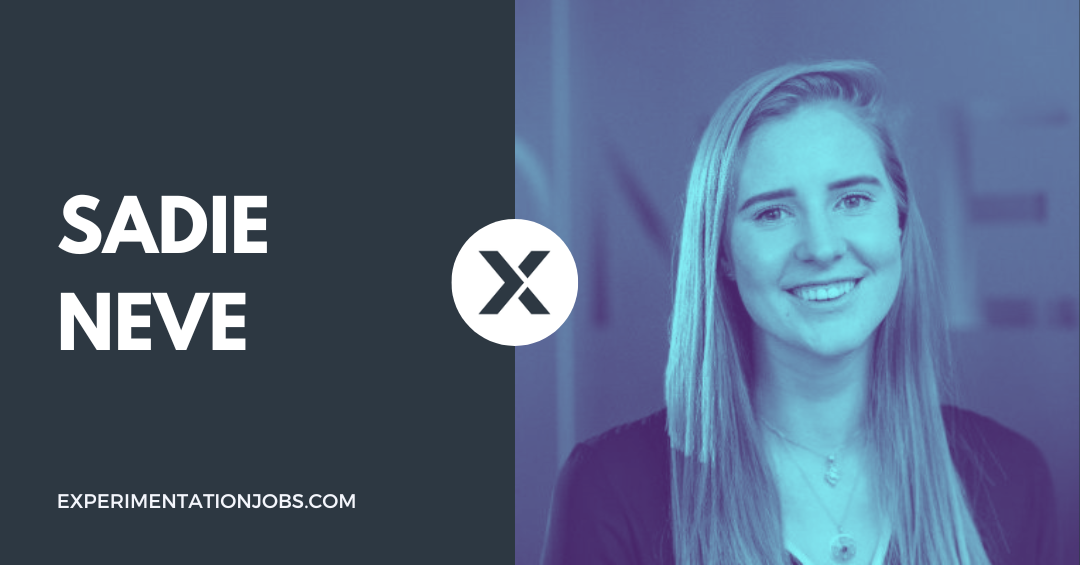The goal of this interview series is to inspire and help people to transition their career into a new or next experimentation related role. In this edition Eduardo “Eddie” Casado shares his journey. He is leading affiliate and technology partnerships at Convert.

Experimentation isn’t about control — it’s about curiosity, patience, and the courage to listen. Progress happens in small, thoughtful iterations that add up to something lasting.
Eddie Casado
What is your current experimentation role and what do you do?
I’m currently leading affiliate and technology partnerships at Convert. I’m approaching this role from a growth perspective, which allows me the scope to run experiments to grow our programs.
How did you enter the experimentation space? What was your first experimentation related role?
Always a tricky question for me. I’m a firm believer that everything amounts to something, so I could say my career started at 15, making radio jingles for a local station. That led me to the audio industry, where I worked as a recording and mixing engineer. It was the perfect sidestep from music, a lifelong passion of mine.
My goal back then was to work nine-to-five doing sound-to-picture for movies and video games, but life works in mysterious ways. I ended up in a recording studio and, somehow, won a Latin Grammy.
My name is Eduardo Enrique Casado Rassi, but people call me Eddie. I was born and raised in Venezuela. After finishing high school, I moved to Miami to continue my studies. Most of my career unfolded between the U.S., Spain, and Denmark, and that multicultural experience has shaped nearly everything I do. Though at times it felt like a broken GPS recalculating.
Back to music. I knew it wasn’t going to cut it for the kind of life I wanted. I was too impatient, and after reconnecting with an estranged uncle and watching Mad Men, I realized advertising was the most sensible next step. I figured I could make a living that way and keep music as a passion. Today, I still moonlight as a mixing engineer and remain active in the industry.
So, “professionally speaking,” my career really started as an account executive at an agency in Miami. As I progressed, I found myself increasingly drawn to the center of campaign development and operations. The role of account planner felt like a better fit. That was my first real clue that I was leaning toward product and growth before I even knew those fields existed.
But that agency experience was short-lived. Another firm called me to handle social media for an ESPN Deportes property and live-tweet the 2014 World Cup. That was “the dream.”
Social media was the new frontier. I dove in, learned the ins and outs, managed multiple properties, and eventually became a Digital Content Manager. I worked on campaigns for The X Factor UK, America’s Got Talent, Transformers, Dancing with the Stars, and many others.
Then life took another unexpected turn. The company that had promised to process my H1B visa missed the deadline, and my OPT was about to expire. Returning to Venezuela wasn’t a good option, so I took the opportunity to move to Barcelona to work at my agency’s sister company.
In Barcelona, a strong survival instinct kicked in. I realized that if I wanted to stay in the firm, I had to bring in new business. So I did. In 2015, I led a project for one of Spain’s biggest production companies, Mediapro. We launched a live-streaming electronic music platform called Groovety across web and mobile.
That project introduced me to a new obsession: measurement. I became fixated on figuring out what worked, what didn’t, and how to move people from one point to another. It was my first real taste of what experimentation feels like.
A year later, the agency invested in a music app, and I moved back to the U.S., this time to Charlotte, North Carolina, to help market it. The only catch was figuring out a way to legally work there again. My wife and I invested our savings in a small business that would allow me to qualify for a visa and were on our way.
Vertigo Music was my ode to measurement. I quickly realized that measurement and attribution weren’t anyone’s responsibility, so I stepped in. I became the product owner, writing user stories, QA events, and tracking plans. I managed implementation with tools like Localytics, Appsflyer, and Mixpanel. I made sure we could capture and understand usage data from the app. That period taught me more about data and decision-making than any formal training ever could. I didn’t know it then, but I was learning the foundation of modern growth practice.
Eventually, the agency suggested pursuing an EB-1 visa based on my career achievements and Grammy recognition. The process was long, stressful, and, ultimately, unsuccessful. Around the same time, the agency decided startups weren’t their focus and discontinued the project. I lost my job, and two weeks later, sold everything we owned and moved back to Spain — this time to Madrid.
That’s where I joined Amovens, a mobility company doing ridesharing, peer-to-peer car rental, and long-term rentals. I was handling Paid Social and Adwords, but something didn’t add up. We were spending $15K a month on ridesharing campaigns without clear ROI. I recommended turning them off. My team thought I was crazy, but we did it. Nothing changed. The numbers held steady, and now I had $15K to reallocate. I decided to put it into our rental vertical, which nobody was really focusing on. Nine months later, we’d sold over 2,000 cars. That was my first big “experiment.”
After that, things moved fast. I became Head of Marketing within ten months, and soon after, I landed my first CMO role at a startup focused on social experiences. It didn’t last long, but by then, I’d realized I was more of a “product person” who spoke marketing fluently. A few years later, that became the definition of a growth marketer.
From there, I joined a startup reinventing contact books using blockchain technology. We were a small team, and I worked closely on activation and retention. Then COVID hit. Funding disappeared, and like many others, I had to figure out what was next.
That’s when everything came full circle. During my time at Amovens, I’d built a great relationship with a colleague who later joined Mouseflow. She asked for my help translating some campaigns, and that connection turned into a full-time role.
Mouseflow was where I truly grew into my growth and experimentation mindset. I was the second marketing hire, joining a team of 12. Over five years, we grew to more than 50 people and doubled ARR. Along the way, I moved to the U.S. for an MBA, then back to Madrid again. I built my first CRO campaign at Mouseflow and met an incredible group of people in the experimentation community who welcomed me with open arms.
In March 2024, that campaign sparked something in me. I knew this was my tribe. And, a year later, I joined Convert.com to work even closer with them.I came across a post from Trina, Convert’s CMO, looking for someone to launch and manage the Affiliate and Technology Partnerships programs. I already knew Convert, understood the audience, and wanted a new challenge that still lived in the experimentation space. Partnerships felt like the perfect blend of creativity, growth, and experimentation. I reached out, we connected immediately, and a month later, I started my current role.
At the same time, I took a part-time position leading growth at Nurture.is – a game that builds kids life skills through engaging adventures, which brought me back to mobile marketing and attribution. This allowed me to set the foundations of a growth department and operation.
And here we are.
How did you start to learn experimentation?
The deeper I got into growth, the more I realized that experimentation was at the center of everything. Early on, I took a Growth Hacking course from Eazl, which gave me the vocabulary and basic structure to think in terms of hypotheses, testing, and iteration. But honestly, I’ve always learned best by doing.
Every growth role I’ve had has taught me something about experimentation, even before I knew to call it that. Whenever I worked on a campaign, I found myself asking the same questions: What if we changed this? What’s actually moving the needle here?
By the time I joined Mouseflow, I was ready to formalize those instincts. I wanted to bring more structure and discipline to how we tested ideas, so I started exploring experimentation frameworks. I reached out to my network, talked to CRO professionals who were way ahead of me, and absorbed everything I could.
Experimentation became a natural extension of my growth work. It wasn’t just about improving ROI anymore. It was about understanding users at a deeper level, creating better experiences, and building a culture where learning was the real outcome.
My framework for learning is simple: curiosity first, structure later, and a lot of lessons learned through doing.
How do you apply experimentation in your personal life? (what are you tinkering with or always optimizing?)
The biggest and most meaningful experiment life has given me is raising my son. He is autistic and faces challenges in a few areas of daily life, so I’ve found myself applying the same principles I use at work: observation, iteration, and adaptation.
When something isn’t working at school, we start by looking at what might be behind it. Is it the environment? The schedule? The way instructions are being given? Once we have a hypothesis, we make small changes, see what improves, and adjust from there. It’s the same mindset as any experiment: identify, test, learn, and refine. Only this time, the outcome matters more than anything else.
Over time, I’ve learned that experimentation isn’t about control. It’s about listening, staying patient, and paying close attention to the small signals that show us what’s working. Raising him has taught me that progress can be subtle but deeply meaningful.
In many ways, he has made me a better experimenter. At home and at work, I’ve learned that improvement rarely happens in a straight line. It happens in small, thoughtful iterations that add up to something lasting.
What are you currently doing to keep up with the ever-changing industry?
I’ve made it a point to stay curious and to keep learning every day. Lately, I’ve been leaning heavily on AI to help me stay ahead. I use it to explore new perspectives, summarize research, and refine my own thinking. I’m constantly improving how I prompt it so I can get better, more relevant answers that actually add value to my work.
I also let my feeds and algorithms play their part. They surface things I wouldn’t normally look for and help me discover ideas outside my comfort zone. It keeps my information diet diverse and a bit unpredictable, which I’ve found is a good thing.
And because I believe in learning on my own terms, I invest time in asynchronous education. I regularly take online courses and certifications to stay sharp, explore new tools, and keep my skill set evolving with the industry.
What recommendations would you give to someone who is looking to join the experimentation industry and get their first full-time position?
Focus on your soft skills as much as your technical ones. Experimentation can be highly technical, but success often depends on how well you can communicate, influence, and collaborate. Early in my career, I knew how to execute a plan, but I didn’t always have the tools to get buy-in, deal with HiPPOs, or defend an idea under scrutiny.
You’ll learn that building an experimentation program is about more than running tests or analyzing data. It’s about managing what happens around the experiments: aligning teams, managing expectations, and telling the story behind the results.
If I had to break it down, I’d say 80% of experimentation is managing people, priorities, and context, and only 20% is running the actual experiments. Mastering that balance early will set you apart.
Which developments in experimentation excite you? How do you see the field changing in the next 5 to 10 years?
I’m genuinely excited about the role of AI in experimentation. For a long time, I didn’t have the support I needed when I felt inadequate or when imposter syndrome crept in. Now, I have something that acts as a sounding board to work through complex concepts, even in areas outside my expertise.
Looking ahead, I believe the CRO world will continue to face big challenges around privacy regulations. The more restrictions come into play, the harder it becomes to accurately measure and attribute results. At the same time, I see many companies betting heavily on AI, assuming it will replace much of the critical thinking involved in experimentation. Personally, I don’t think that will happen anytime soon.
Our capacity to process data will keep expanding, but AI will still need time to catch up with our ability to contextualize what that data actually means, especially when it comes to qualitative insights.
I also believe experimentation will continue to gain its rightful place in business decision-making. As budgets tighten, teams with the resources to test quickly and frequently those with enough “real estate” to run high-velocity experiments will have a clear advantage.
One thing that won’t change is the tension between accuracy and speed. Audiences grow only so fast, and even with AI helping us analyze and build experiences faster, we still depend on real people and real behavior to reach significance.
In my view, CRO will continue to mature into a strategic voice within marketing and growth operations. The future belongs to those who combine data-driven thinking with empathy, creativity, and patience. These qualities no algorithm can truly replicate.
Is there anything people reading this can help you with? Or any parting words?
My parting thought would be to stay curious and kind to yourself and to others. We’re all just experimenting in different ways, trying to make things a little better than they were before.And if I wanted to make this a bit self-serving, I’d say that I’m looking for feedback on Convert’s Ambassador Program. If you’re part of the experimentation community and want to help us shape how we celebrate and empower advocates in this space, I’d love to hear your thoughts.
Which other experimenters would you love to read an interview by?
Perhaps somebody from Hockeystack or Dreamdata.
Thank you Eddie for sharing your journey and insights.



